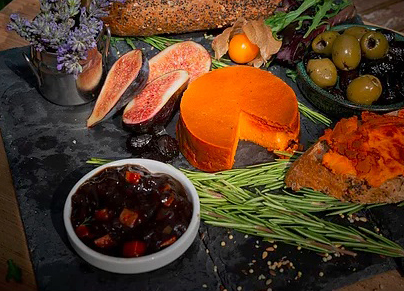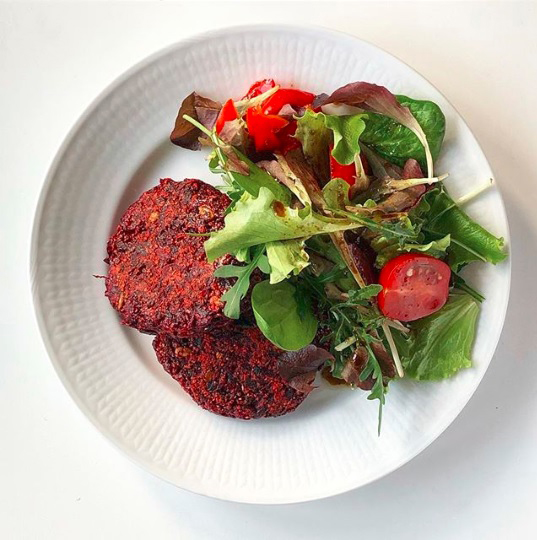There's little doubt about it: In the past decade, Britons have changed the way they eat. Meat consumption has plummeted, and the number of vegans is said to have quadrupled in the past four years. The UK is now the vegan capital of the world.
Meanwhile, plant-based alternatives to animal products are on the rise. Last year, the world witnessed a drought of oat milk, leaving east London's coffee-shop dwellers high and dry. To prevent this happening again, Oatly promised to ramp up production by 1,250%.
Increased use of social media is likely to blame: people want food that reflects well on their decisions, and it has to look perfect, too.
The fact that Arpège chef Alain Passard, who only cooks with vegetables won the Instagram account of the year at the World Restaurant Awards says it all.
An increasing number of substitutes – and I choose my words carefully here – for cheese and meat now populate supermarket shelves.
But are plant-based meat and dairy alternatives really any good?
To give ourselves an idea of what you think, we asked you whether there is was such a thing as good vegan cheese. Nine out of ten of you said no.
Some say vegan cheese isn’t 'real' cheese since an EU court banned giving dairy product names to plant-based alternatives. Others complain that it is tasteless, filled with coconut oil and artificial gums added to mimic the texture of dairy cheese.
For Alan Paton, head chef at Stoke by Nayland Hotel, vegan cheese - as opposed to other types of vegan replacements, like burgers and sausages, is acceptable, because “you have to have a word to say that this is a version of that.”
And while many low and mid-market spreads and products “taste absolutely horrific,” some are putting their heart and soul into creating something that tastes good and is a viable alternative.
It's important to remember that it takes time to create great products: “some of the best cheese in this country isn’t made overnight, it’s taken time to mature and craft.”
This is what Ami and James Deane had in mind when they founded Tyne Chease, an artisanal alternative to dairy cheese. The idea wasn't to make it taste like it was made with animal milk, explained Ami:
“We see it as a different style of cheese, which you could incorporate on a cheese board."
Made using cashew nuts, the rounds are cultured with a probiotic before being aged for three to four weeks to create a firm rind and a soft centre. Ami said the process of making it is fairly straightforward, and that she wouldn’t be surprised if restaurants started making their own - just like they make burrata, or butter.
 Tyne's smoked chease, a customer favourite+3
Tyne's smoked chease, a customer favourite+3
While resellers include health food shops and the controversial Fauxmagerie in Brixton Village Market – against whom Dairy UK could take legal action for allegedly misleading customers - it is increasingly stocked by restaurants, cafes and dairy cheese mongers, too.
As for plant-based meat substitutes, Alan said, some have more merit than others.
“I don’t agree with vegan sausages and vegan burgers. In the eighties, we called it a bean burger.”
Vegetarian burgers have come a long way since; we now have the Impossible Burger, which actually bleeds and has been endorsed by chefs Gordon Ramsay, Wolfgang Puck and David Myers.
But for Alan, this doesn't make any sense.
He said: “Why would any self-respecting vegetarian or vegan want to experience what a meat eater’s having when they’ve built their whole internal culinary ethos against it?”
“Vegan burgers with beetroot juice for blood, what the hell is the point of that? It’s like turkey bacon, what the fuck is turkey bacon?”
 +3
+3
Bleedin beetroot burgers. Photo credit: @lassenielsen
Author and chef Jo Pratt said that from a restaurant point of view, trying to keep up with food trends can be frustrating.
"You think to yourself ‘well hold on, what’s the next thing going to be.’”
Increasingly, she said, it’s what about what’s on the plate, but what’s been removed, and this affects the way food looks and tastes – and not always for the better.
But for Alan, it's a no brainer: if the customer wants it, there’s money to be made.
He said it’s important to be flexible instead of adopting the derisory “what the fuck now have we got to do now” attitude, because it gets to the point that waiting staff are afraid to ask the kitchen to adapt their food, and that’s money lost.
Plus, it has become increasingly difficult for chefs to get work if they can’t adapt, and older chefs should take a leaf from young chefs' book. He named Killarney chef Chad Byrne, who became vegan for a month to "see things from the other side."
And rather than inhibit the chef's creativity, he said, it encouraged it.
“As we all know, this is the one job we have, there’s no stopgap, there’s no point where you go ‘okay, I know it all.’ You don’t, you never will.”
What are your thoughts? Do you think food trends are a good way of trying out new things, or are you a die hard traditionalist? Answer in the comments below, or join us on Facebook or Twitter to continue the debate.


 Tyne's smoked chease, a customer favourite
Tyne's smoked chease, a customer favourite













Sara Dawn
Sara Dawn
Sara Dawn
There are no comments yet.
You could be commenting on this if you had an account! Click here to sign up.